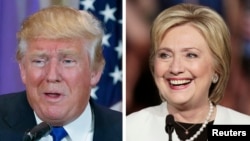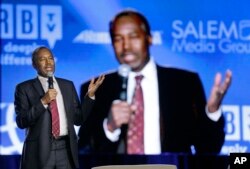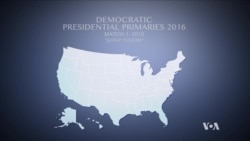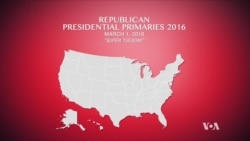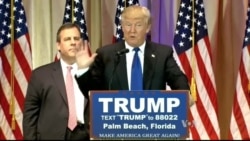The U.S. presidential candidates on Wednesday moved past the excitement of Super Tuesday voting and focused on the next two weeks, when more than a dozen states and several territories hold primary elections or caucuses that will likely winnow the number of those still campaigning.
Democrat Hillary Clinton and Republican Donald Trump strengthened their grips on each party's presidential nominations, racking up wins in key states Tuesday, when the largest number of states hold primaries or caucuses on the same day.
US Presidential Candidate Delegate Count
Delegate Count
Here is an estimated delegate count for each candidate:
Republicans
Donald Trump: 621
Ted Cruz: 396
John Kasich: 138
Democrats
Hillary Clinton: 1,561
Bernie Sanders: 800
Total delegates needed for party nomination:
Democrats: 2,383
Republicans: 1,237
* As of March 16, 2016
For Democrats, the next big contest will be the primary election March 8 in Michigan, a populous state that accounts for 148 delegates to the national party's convention in July. Michigan accounts for more than 10 percent of the total delegate votes necessary to become the party's candidate for president in the general election, held this year on November 8.
Upcoming contests
Former Secretary of State Clinton led her rival, U.S. Senator Bernie Sanders, 50 percent to 40 percent in a February 18 survey of likely Michigan voters by Public Policy Polling. The two are scheduled to debate Sunday (8 p.m. EST / 0100 UTC Monday) in Flint, a city at the center of a drinking-water contamination crisis.
For the Republicans, primary votes in delegate-rich Ohio and Florida on March 15 could narrow the number of party candidates.
Ohio has 66 delegates and Florida has 99, all going to the candidate finishing first in election – the so-called "winner-take-all" system, in contrast to other states that allocate delegates either proportionally or on some other basis.
Ohio Governor John Kasich and Florida Senator Marco Rubio are under particular pressure to win their respective states' contests; political analysts say their candidacies may not survive a home-state loss.
Both Kasich and Rubio have finished well behind businessman Trump and Texas Senator Ted Cruz in almost all of this year's presidential preliminaries.
Republican presidential candidate Ben Carson, while not formally dropping out of the race, released a statement Wednesday saying he sees "no path forward" to the nomination.
Carson said he will not attend Thursday night's Republican presidential debate in Detroit, his hometown. The former neurosurgeon has done poorly in the 15 presidential nominating contests so far this year.
It was not immediately clear whether Carson would officially suspend his campaign. Armstrong Williams, Carson's longtime business manager, told The Associated Press the candidate will no longer actively seek votes.
With active campaigning underway in so many states during the coming two weeks, candidates have begun increasing their advertising to woo potential voters. Before the Super Tuesday voting, Republicans' anti-Trump ads outnumbered pro-Trump commercials nearly 3-to-1, and that ratio is likely to grow.
Attack ads to increase
Three outside groups, Our Principles, American Future Fund and Club for Growth, have laid plans for millions of dollars in new ads attacking front-runner Trump.
Conservative Solutions, a "superPAC" political action committee that backs Rubio and opposes Trump, has reserved $6 million of ad time for broadcast in Michigan, Florida and two other big states voting soon - Illinois and Missouri.
On the Democratic side, Michigan appears to be a "battleground" state between Clinton and Sanders.
The senator from Vermont, who has strong financial backing but fell well short of Clinton's vote totals on Super Tuesday, is allocating two-thirds or more of the donations to his campaign on advertising there.
WATCH: State-by-state Democratic results
Clinton, who hopes to become the first woman elected U.S. president, won Tuesday's primary votes in Alabama, Arkansas, Georgia, Massachusetts, Tennessee, Texas and Virginia. Sanders, who says he is a Democratic socialist, won his home state of Vermont plus Colorado, Minnesota and Oklahoma.
On the Republican side, Trump took Alabama, Arkansas, Georgia, Massachusetts, Tennessee, Virginia and Vermont. Senator Ted Cruz took his home state of Texas, as well as Oklahoma and Alaska. Florida Senator Marco Rubio picked up his first win of the primary season in Minnesota.
Opinion polls
The results were not surprising. Opinion polls had showed Trump and Clinton with large leads in Super Tuesday states and nationally. In their victory speeches, each candidate focused on the other, rather than their primary opponents.
WATCH: State-by-state Republican results
"America never stopped being great," Clinton said at a rally in Florida, referencing Trump's campaign slogan. "We have to make America whole," she said, adding that the rhetoric on the Republican side "has never been lower."
At his own speech in Florida, Trump shot back. "She wants to make America whole again. I'm trying to figure what that's all about. Making America great again is going to be much better than making America whole again."
Trump also spoke of his rival, Rubio, whom he has clashed with fiercely over the past week. "I know it as a very rough night for Marco Rubio. He worked hard, he spent a lot of money. He is a lightweight, like I have said many times," Trump said.
"Rubio was the big loser of the night," Trump added.
WATCH: Report by VOA's Jim Malone
Speaking to a large crowd in his home state late Tuesday, Sanders stayed optimistic.
"This campaign, as I think all of you know, is not just about electing a president, it is about transforming America. It is about making our great nation the country we know it has the potential to be."
Sanders stressed that Democratic primaries are proportional, and that they award delegates according to the vote count. "By the end of tonight, we are going to win many hundreds of delegates," he said.
VOA's WIlliam Gallo contributed to this report. Some material also came from AP.




